
deepchat
🐬DeepChat - A smart assistant that connects powerful AI to your personal world
Stars: 5496
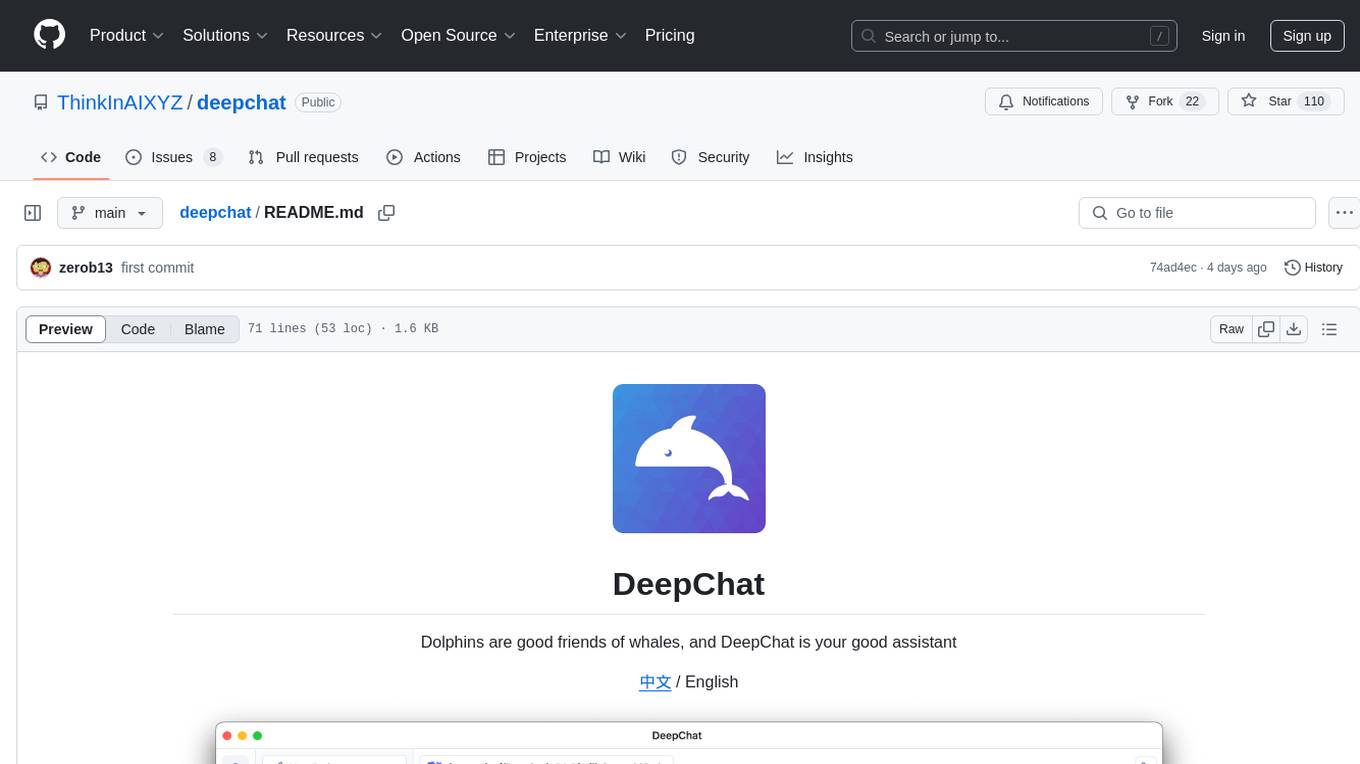
DeepChat is a versatile chat tool that supports multiple model cloud services and local model deployment. It offers multi-channel chat concurrency support, platform compatibility, complete Markdown rendering, and easy usability with a comprehensive guide. The tool aims to enhance chat experiences by leveraging various AI models and ensuring efficient conversation management.
README:
DeepChat is a feature-rich open-source AI agent platform that unifies models, tools, and agents: multi-LLM chat, MCP tool calling, and ACP agent integration.
This project is sponsored by Z.ai, supporting us with their GLM CODING PLAN. GLM CODING PLAN is a subscription service designed for AI coding, starting at just $3/month. It provides access to their flagship GLM-4.7 model across 10+ popular AI coding tools (Claude Code, Cline, Roo Code, etc.), offering developers top-tier, fast, and stable coding experiences. Get 10% OFF GLM CODING PLAN:https://z.ai/subscribe?ic=8JVLJQFSKB
- 📑 Table of Contents
- ❤️ Sponsor
- 🚀 Project Introduction
- 💡 Why Choose DeepChat
- 🔥 Main Features
- 🧩 ACP Integration (Agent Client Protocol)
- 🤖 Supported Model Providers
- 🔍 Use Cases
- 📦 Quick Start
- 💻 Development Guide
- 👥 Community & Contribution
- ⭐ Star History
- 👨💻 Contributors
- 📃 License
DeepChat is a powerful open-source AI agent platform that brings together models, tools, and agent runtimes in one desktop app. Whether you're using cloud APIs like OpenAI, Gemini, Anthropic, or locally deployed Ollama models, DeepChat delivers a smooth user experience.
Beyond chat, DeepChat supports agentic workflows: rich tool calling via MCP (Model Context Protocol), and unique ACP (Agent Client Protocol) integration that lets you run ACP-compatible agents as first-class “models” with a dedicated workspace UI.
|
|
|
Compared to other AI tools, DeepChat offers the following unique advantages:
- Unified Multi-Model Management: One application supports almost all mainstream LLMs, eliminating the need to switch between multiple apps
- Seamless Local Model Integration: Built-in Ollama support allows you to manage and use local models without command-line operations
- Agentic Protocol Ecosystem: Built-in MCP support enables tool calling (code execution, web access, etc.), and built-in ACP support connects external agents into DeepChat with a native workspace UX
- Powerful Search Enhancement: Support for multiple search engines makes AI responses more accurate and timely, providing non-standard web search paradigms that can be quickly customized
- Privacy-Focused: Local data storage and network proxy support reduce the risk of information leakage
- Business-Friendly: Embraces open source under the Apache License 2.0, suitable for both commercial and personal use
- 🌐 Multiple Cloud LLM Provider Support: DeepSeek, OpenAI, Kimi, Grok, Gemini, Anthropic, and more
- 🏠 Local Model Deployment Support:
- Integrated Ollama with comprehensive management capabilities
- Control and manage Ollama model downloads, deployments, and runs without command-line operations
- 🚀 Rich and Easy-to-Use Chat Capabilities
- Complete Markdown rendering with code block rendering based on industry-leading CodeMirror
- Multi-window + multi-tab architecture supporting parallel multi-session operations across all dimensions, use large models like using a browser, non-blocking experience brings excellent efficiency
- Supports Artifacts rendering for diverse result presentation, significantly saving token consumption after MCP integration
- Messages support retry to generate multiple variations; conversations can be forked freely, ensuring there's always a suitable line of thought
- Supports rendering images, Mermaid diagrams, and other multi-modal content; supports GPT-4o, Gemini, Grok text-to-image capabilities
- Supports highlighting external information sources like search results within the content
- 🔍 Robust Search Extension Capabilities
- Built-in integration with leading search APIs like BoSearch, Brave Search via MCP mode, allowing the model to intelligently decide when to search
- Supports mainstream search engines like Google, Bing, Baidu, and Sogou Official Accounts search by simulating user web browsing, enabling the LLM to read search engines like a human
- Supports reading any search engine; simply configure a search assistant model to connect various search sources, whether internal networks, API-less engines, or vertical domain search engines, as information sources for the model
- 🔧 Excellent MCP (Model Context Protocol) Support
- Complete support for the three core capabilities of Resources/Prompts/Tools in the MCP protocol
- Supports semantic workflows, enabling more complex and intelligent automation by understanding the meaning and context of tasks.
- Extremely user-friendly configuration interface
- Aesthetically pleasing and clear tool call display
- Detailed tool call debugging window with automatic formatting of tool parameters and return data
- Built-in Node.js runtime environment; npx/node-like services require no extra configuration and work out-of-the-box
- Supports StreamableHTTP/SSE/Stdio protocol Transports
- Supports inMemory services with built-in utilities like code execution, web information retrieval, and file operations; ready for most common use cases out-of-the-box without secondary installation
- Converts visual model capabilities into universally usable functions for any model via the built-in MCP service
- 🤝 ACP (Agent Client Protocol) Agent Integration
- Run ACP-compatible agents (built-in or custom commands) as selectable “models”
- ACP workspace UI for structured plans, tool calls, and terminal output when provided by the agent
- 💻 Multi-Platform Support: Windows, macOS, Linux
- 🎨 Beautiful and User-Friendly Interface, user-oriented design, meticulously themed light and dark modes
- 🔗 Rich DeepLink Support: Initiate conversations via links for seamless integration with other applications. Also supports one-click installation of MCP services for simplicity and speed
- 🚑 Security-First Design: Chat data and configuration data have reserved encryption interfaces and code obfuscation capabilities
- 🛡️ Privacy Protection: Supports screen projection hiding, network proxies, and other privacy protection methods to reduce the risk of information leakage
- 💰 Business-Friendly:
- Embraces open source, based on the Apache License 2.0 protocol, enterprise use without worry
- Enterprise integration requires only minimal configuration code changes to use reserved encrypted obfuscation security capabilities
- Clear code structure, both model providers and MCP services are highly decoupled, can be freely customized with minimal cost
- Reasonable architecture, data interaction and UI behavior separation, fully utilizing Electron's capabilities, rejecting simple web wrappers, excellent performance
For more details on how to use these features, see the User Guide.
DeepChat has built-in support for Agent Client Protocol (ACP), allowing you to integrate external agent runtimes into DeepChat with a native UI. Once enabled, ACP agents appear as first-class entries in the model selector, so you can use coding agents and task agents directly inside DeepChat.
Quick start:
- Open Settings → ACP Agents and enable ACP
- Enable a built-in ACP agent or add a custom ACP-compatible command
- Select the ACP agent in the model selector to start an agent session
To explore the ecosystem of compatible agents and clients, see: https://agentclientprotocol.com/overview/clients
DeepChat is suitable for various AI application scenarios:
- Daily Assistant: Answering questions, providing suggestions, assisting with writing and creation
- Development Aid: Code generation, debugging, technical problem solving
- Learning Tool: Concept explanation, knowledge exploration, learning guidance
- Content Creation: Copywriting, creative inspiration, content optimization
- Data Analysis: Data interpretation, chart generation, report writing
You can install DeepChat using one of the following methods:
Option 1: GitHub Releases
Download the latest version for your system from the GitHub Releases page:
- Windows:
.exeinstallation file - macOS:
.dmginstallation file - Linux:
.AppImageor.debinstallation file
Option 2: Official Website
Download from the official website.
Option 3: Homebrew (macOS only)
For macOS users, you can install DeepChat using Homebrew:
brew install --cask deepchat- Launch the DeepChat application
- Click the settings icon
- Select the "Model Providers" tab
- Add your API keys or configure local Ollama
- Click the "+" button to create a new conversation
- Select the model you want to use
- Start communicating with your AI assistant
For a comprehensive guide on getting started and using all features, please refer to the User Guide.
Please read the Contribution Guidelines
Windows and Linux are packaged by GitHub Action. For Mac-related signing and packaging, please refer to the Mac Release Guide.
$ pnpm install
$ pnpm run installRuntime
# if got err: No module named 'distutils'
$ pip install setuptools- For Windows: To allow non-admin users to create symlinks and hardlinks, enable
Developer Modein Settings or use an administrator account. Otherwisepnpmops will fail.
$ pnpm run dev# For Windows
$ pnpm run build:win
# For macOS
$ pnpm run build:mac
# For Linux
$ pnpm run build:linux
# Specify architecture packaging
$ pnpm run build:win:x64
$ pnpm run build:win:arm64
$ pnpm run build:mac:x64
$ pnpm run build:mac:arm64
$ pnpm run build:linux:x64
$ pnpm run build:linux:arm64For a more detailed guide on development, project structure, and architecture, please see the Developer Guide.
DeepChat is an active open-source community project, and we welcome various forms of contribution:
- 🐛 Report issues
- 💡 Submit feature suggestions
- 🔧 Submit code improvements
- 📚 Improve documentation
- 🌍 Help with translation
Check the Contribution Guidelines to learn more about ways to participate in the project.
Thank you for considering contributing to deepchat! The contribution guide can be found in the Contribution Guidelines.
This project is built with the help of these awesome libraries:
For Tasks:
Click tags to check more tools for each tasksFor Jobs:
Alternative AI tools for deepchat
Similar Open Source Tools

deepchat
DeepChat is a versatile chat tool that supports multiple model cloud services and local model deployment. It offers multi-channel chat concurrency support, platform compatibility, complete Markdown rendering, and easy usability with a comprehensive guide. The tool aims to enhance chat experiences by leveraging various AI models and ensuring efficient conversation management.
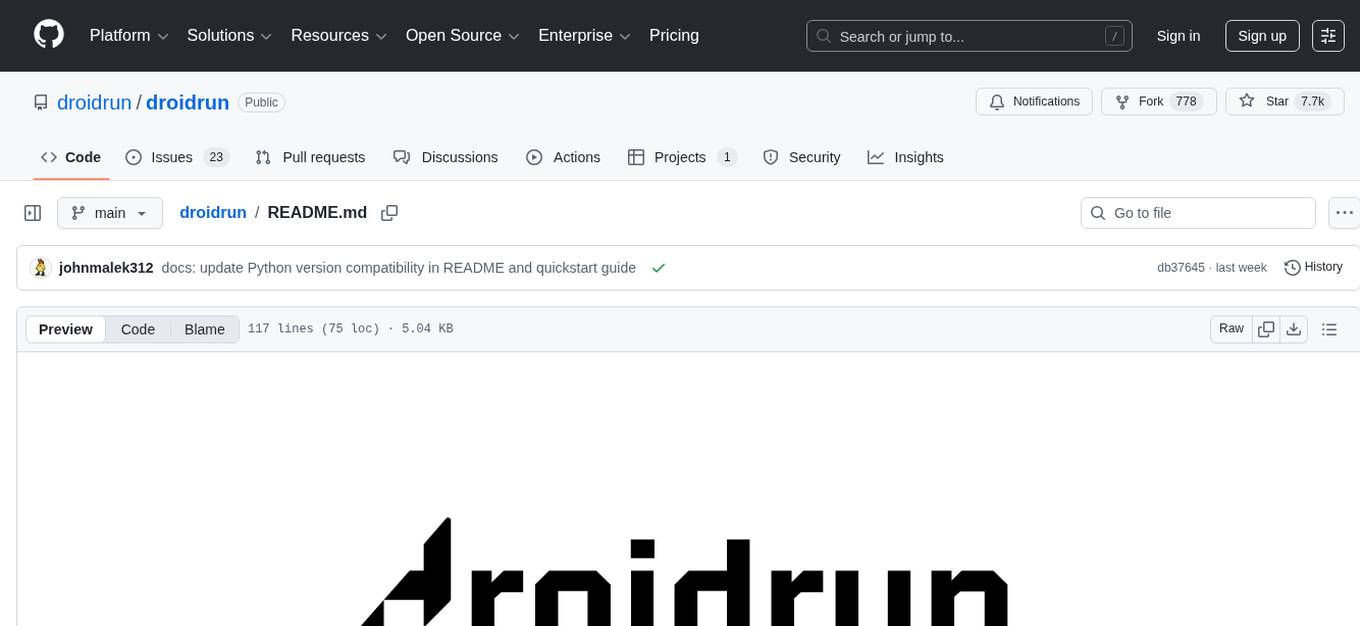
droidrun
DroidRun is a powerful framework for controlling Android and iOS devices through LLM agents. It allows you to automate device interactions using natural language commands. The tool supports multiple LLM providers and offers planning capabilities for complex multi-step tasks. It provides an easy-to-use CLI with enhanced debugging features, an extendable Python API for custom automations, screenshot analysis for visual understanding of the device, and execution tracing with Arize Phoenix.
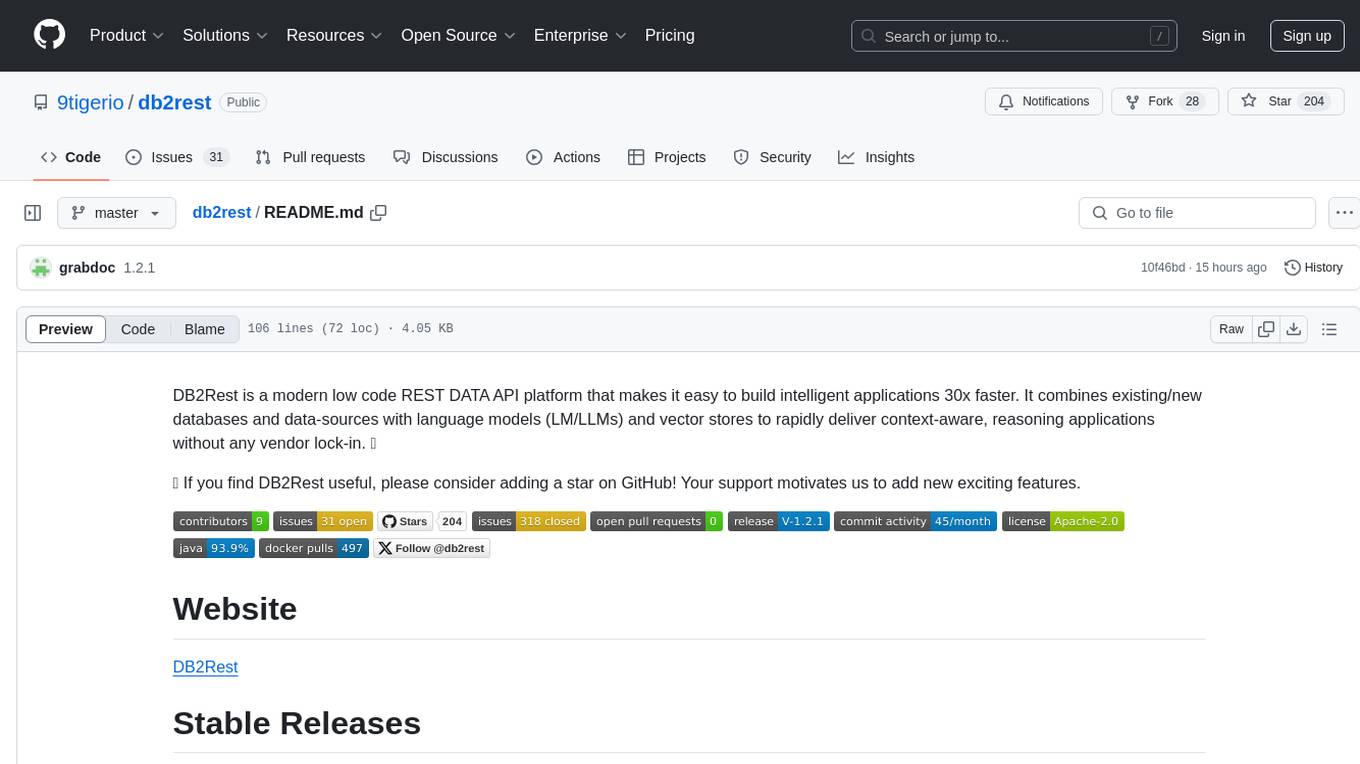
db2rest
DB2Rest is a modern low code REST DATA API platform that enables the rapid development of intelligent applications by combining databases, language models, and vector stores. It facilitates context-aware, reasoning applications without vendor lock-in. The tool accelerates application delivery, fosters faster innovation with AI, serves as a secure database gateway, and simplifies integration. It supports various databases like PostgreSQL, MySQL, MS SQL Server, Oracle, MongoDB, and more, with planned support for additional databases. Users can connect on Discord for support and contact [email protected] for inquiries.
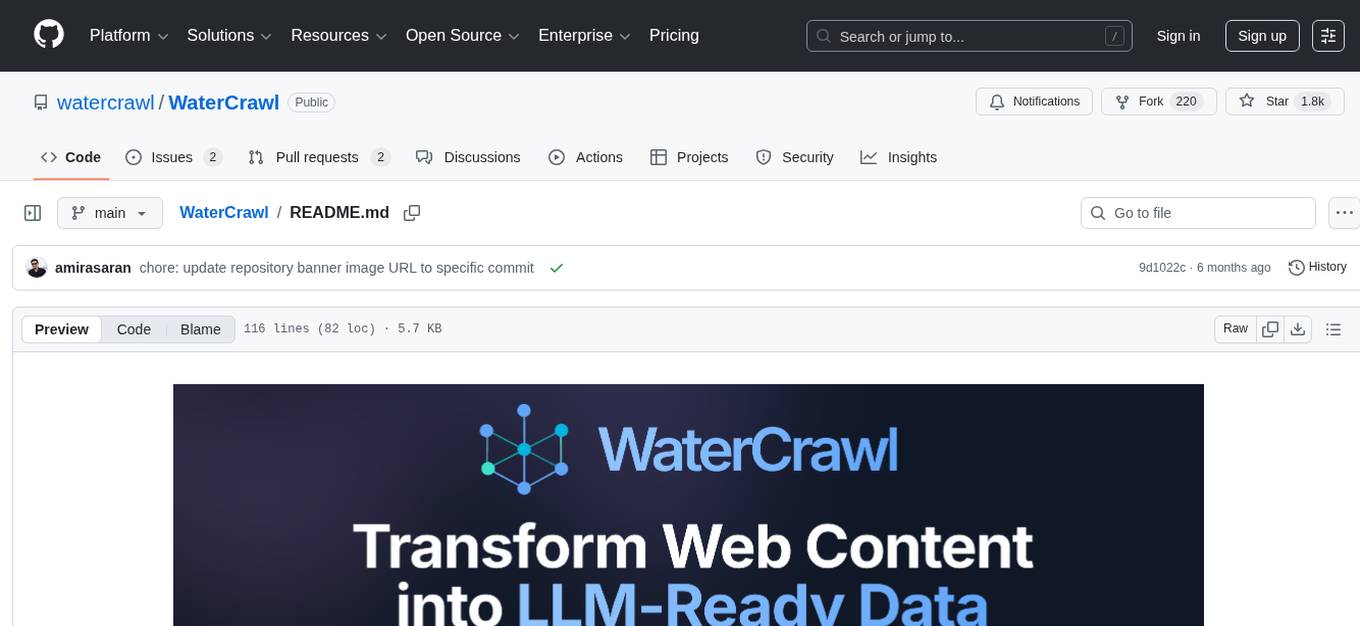
WaterCrawl
WaterCrawl is a powerful web application that uses Python, Django, Scrapy, and Celery to crawl web pages and extract relevant data. It provides advanced web crawling and scraping capabilities, a powerful search engine, multi-language support, asynchronous processing, REST API with OpenAPI, rich ecosystem integrations, self-hosted and open-source options, and advanced results handling. The tool allows users to crawl websites with customizable options, search for relevant content across the web, monitor real-time progress of crawls, and process search results with customizable parameters.
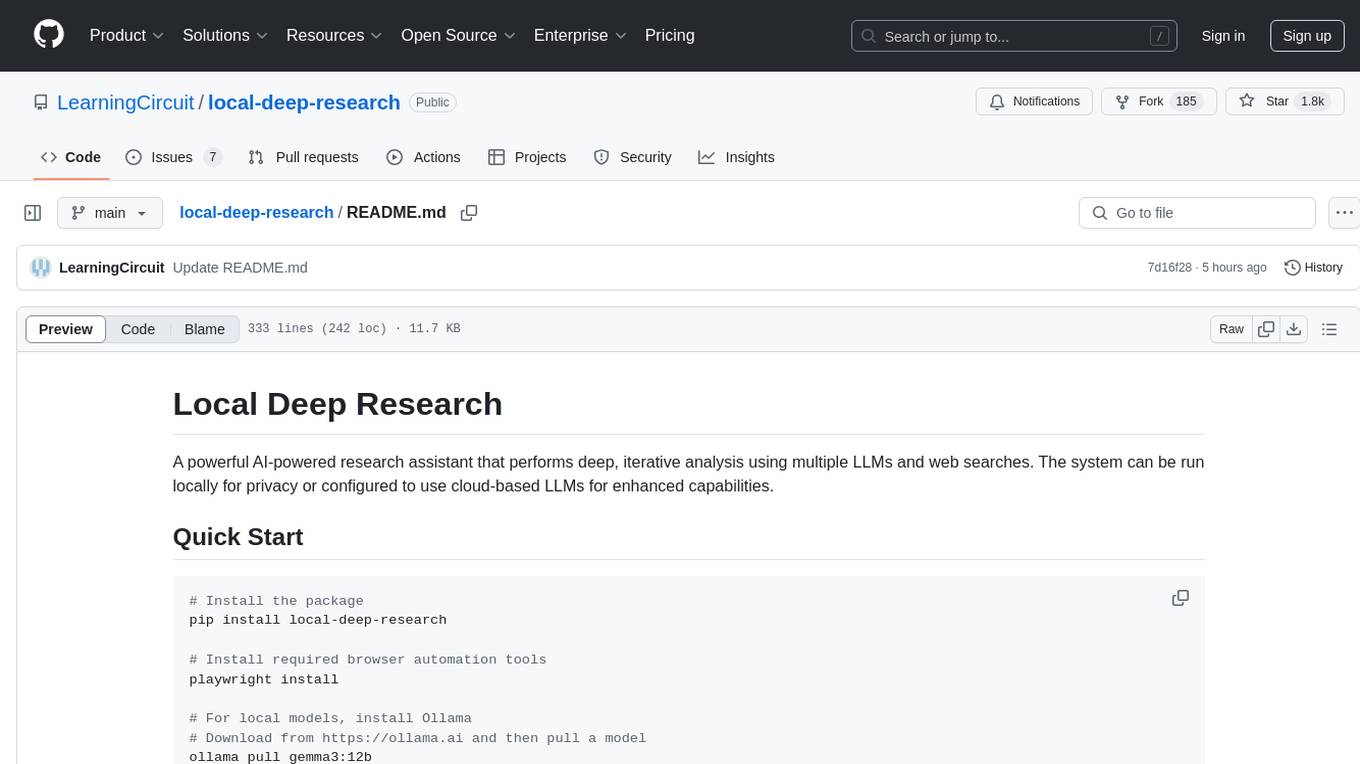
local-deep-research
Local Deep Research is a powerful AI-powered research assistant that performs deep, iterative analysis using multiple LLMs and web searches. It can be run locally for privacy or configured to use cloud-based LLMs for enhanced capabilities. The tool offers advanced research capabilities, flexible LLM support, rich output options, privacy-focused operation, enhanced search integration, and academic & scientific integration. It also provides a web interface, command line interface, and supports multiple LLM providers and search engines. Users can configure AI models, search engines, and research parameters for customized research experiences.
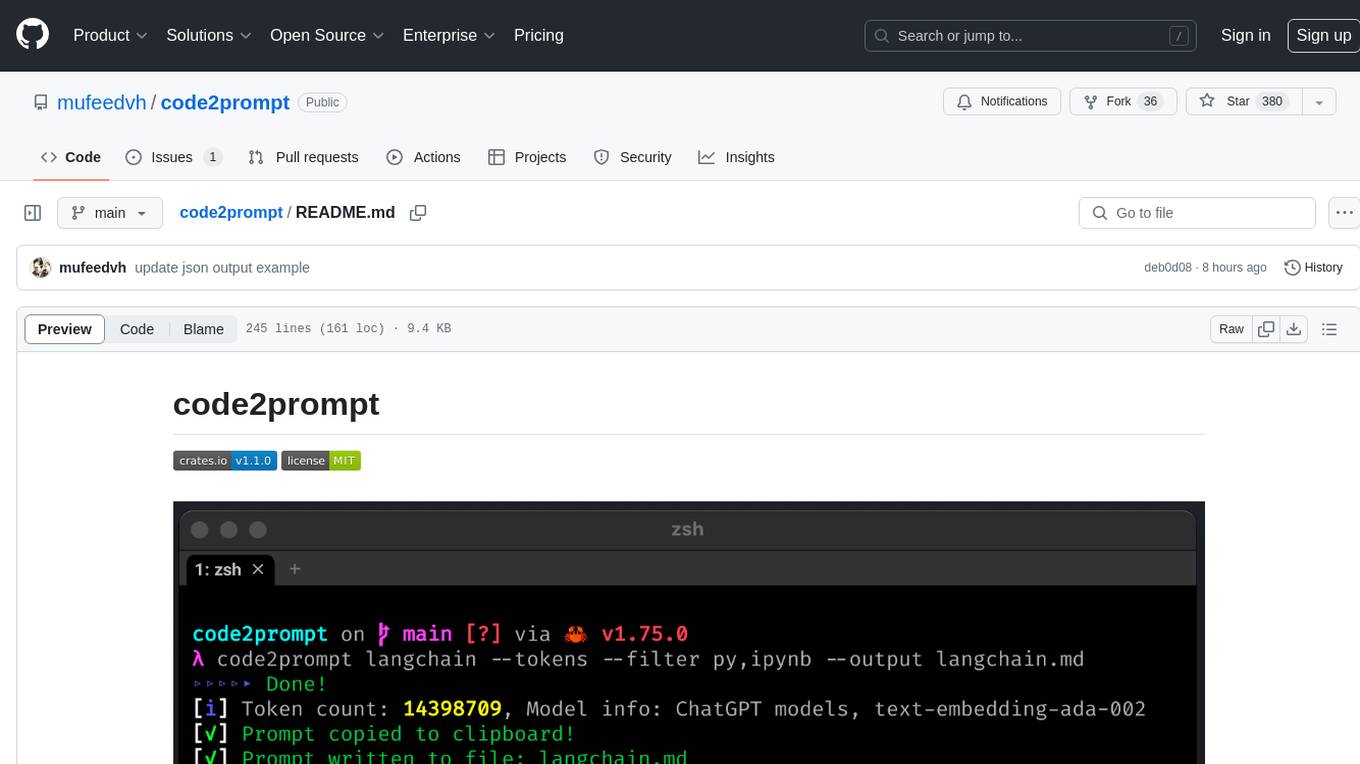
code2prompt
code2prompt is a command-line tool that converts your codebase into a single LLM prompt with a source tree, prompt templating, and token counting. It automates generating LLM prompts from codebases of any size, customizing prompt generation with Handlebars templates, respecting .gitignore, filtering and excluding files using glob patterns, displaying token count, including Git diff output, copying prompt to clipboard, saving prompt to an output file, excluding files and folders, adding line numbers to source code blocks, and more. It helps streamline the process of creating LLM prompts for code analysis, generation, and other tasks.
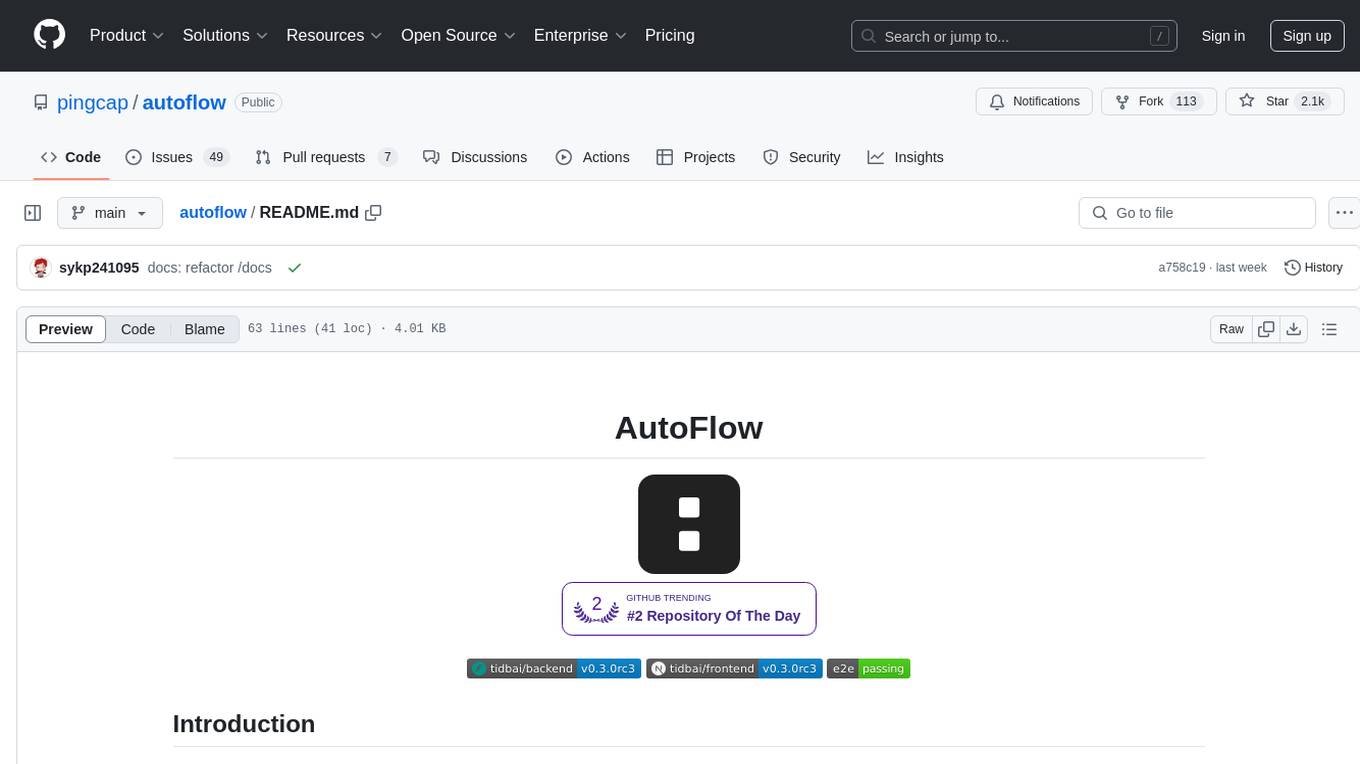
autoflow
AutoFlow is an open source graph rag based knowledge base tool built on top of TiDB Vector and LlamaIndex and DSPy. It features a Perplexity-style Conversational Search page and an Embeddable JavaScript Snippet for easy integration into websites. The tool allows for comprehensive coverage and streamlined search processes through sitemap URL scraping.
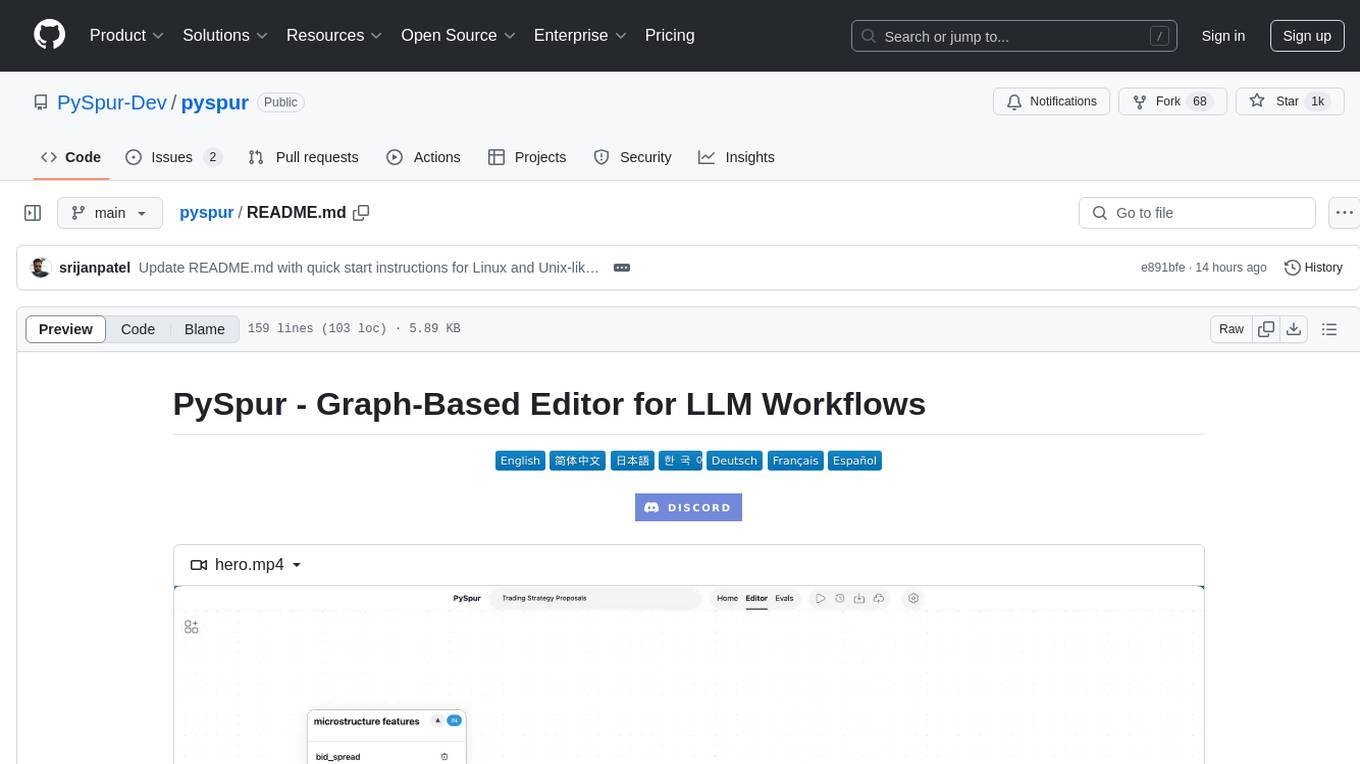
pyspur
PySpur is a graph-based editor designed for LLM (Large Language Models) workflows. It offers modular building blocks, node-level debugging, and performance evaluation. The tool is easy to hack, supports JSON configs for workflow graphs, and is lightweight with minimal dependencies. Users can quickly set up PySpur by cloning the repository, creating a .env file, starting docker services, and accessing the portal. PySpur can also work with local models served using Ollama, with steps provided for configuration. The roadmap includes features like canvas, async/batch execution, support for Ollama, new nodes, pipeline optimization, templates, code compilation, multimodal support, and more.
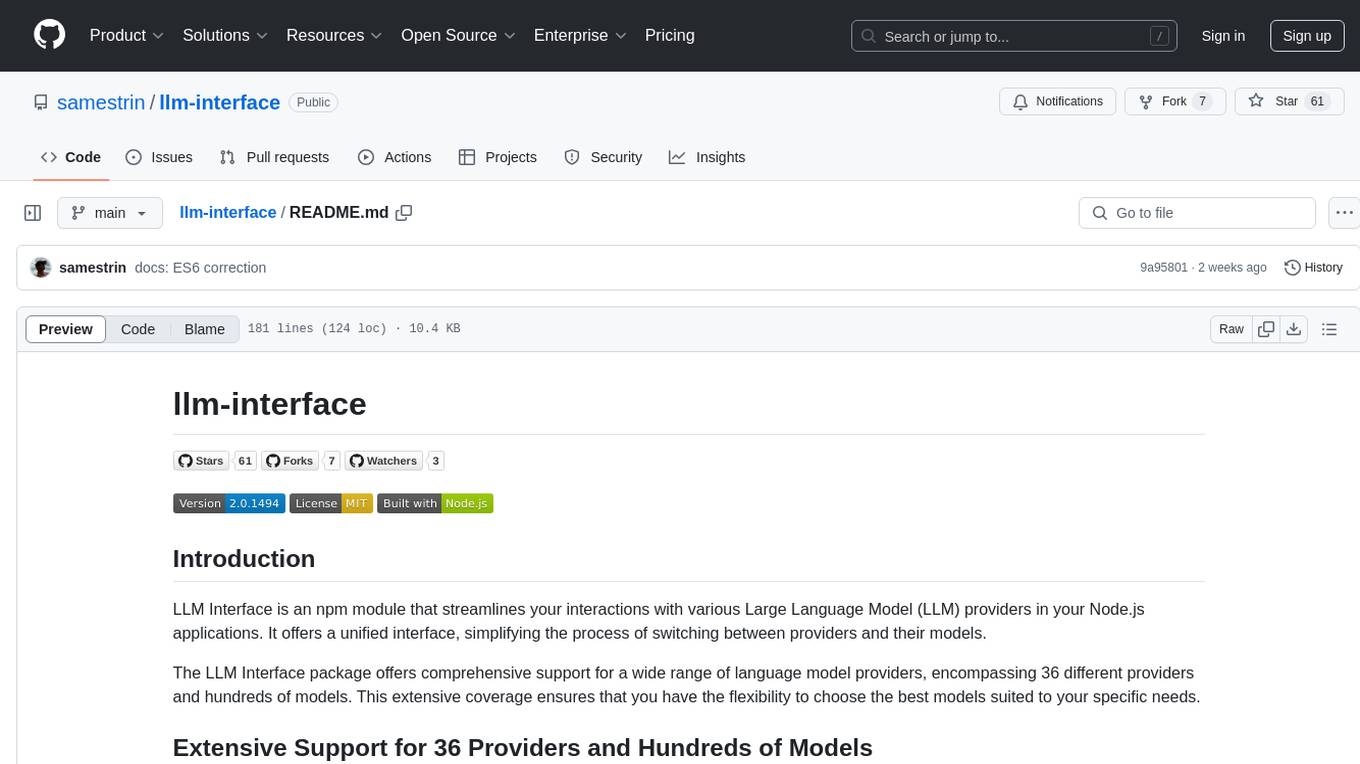
llm-interface
LLM Interface is an npm module that streamlines interactions with various Large Language Model (LLM) providers in Node.js applications. It offers a unified interface for switching between providers and models, supporting 36 providers and hundreds of models. Features include chat completion, streaming, error handling, extensibility, response caching, retries, JSON output, and repair. The package relies on npm packages like axios, @google/generative-ai, dotenv, jsonrepair, and loglevel. Installation is done via npm, and usage involves sending prompts to LLM providers. Tests can be run using npm test. Contributions are welcome under the MIT License.
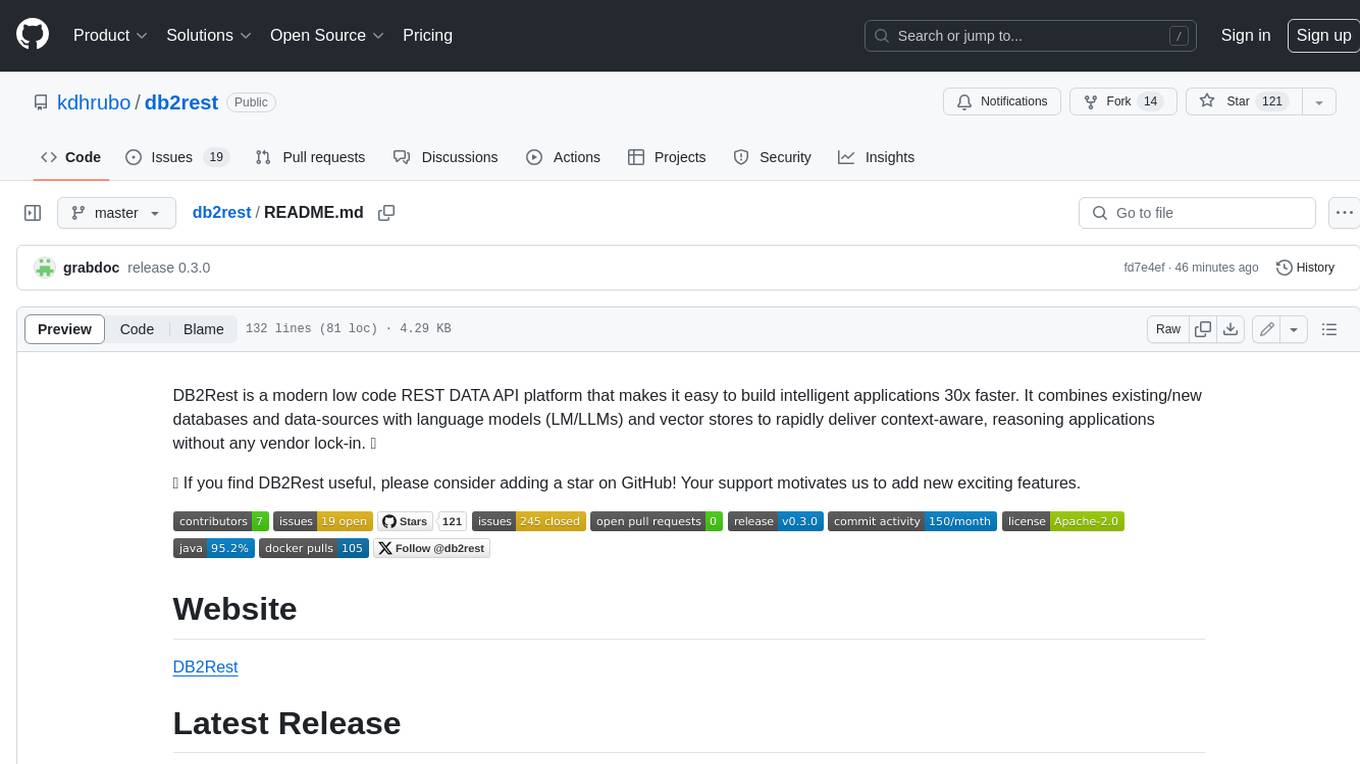
db2rest
DB2Rest is a modern low-code REST DATA API platform that simplifies the development of intelligent applications. It seamlessly integrates existing and new databases with language models (LMs/LLMs) and vector stores, enabling the rapid delivery of context-aware, reasoning applications without vendor lock-in.
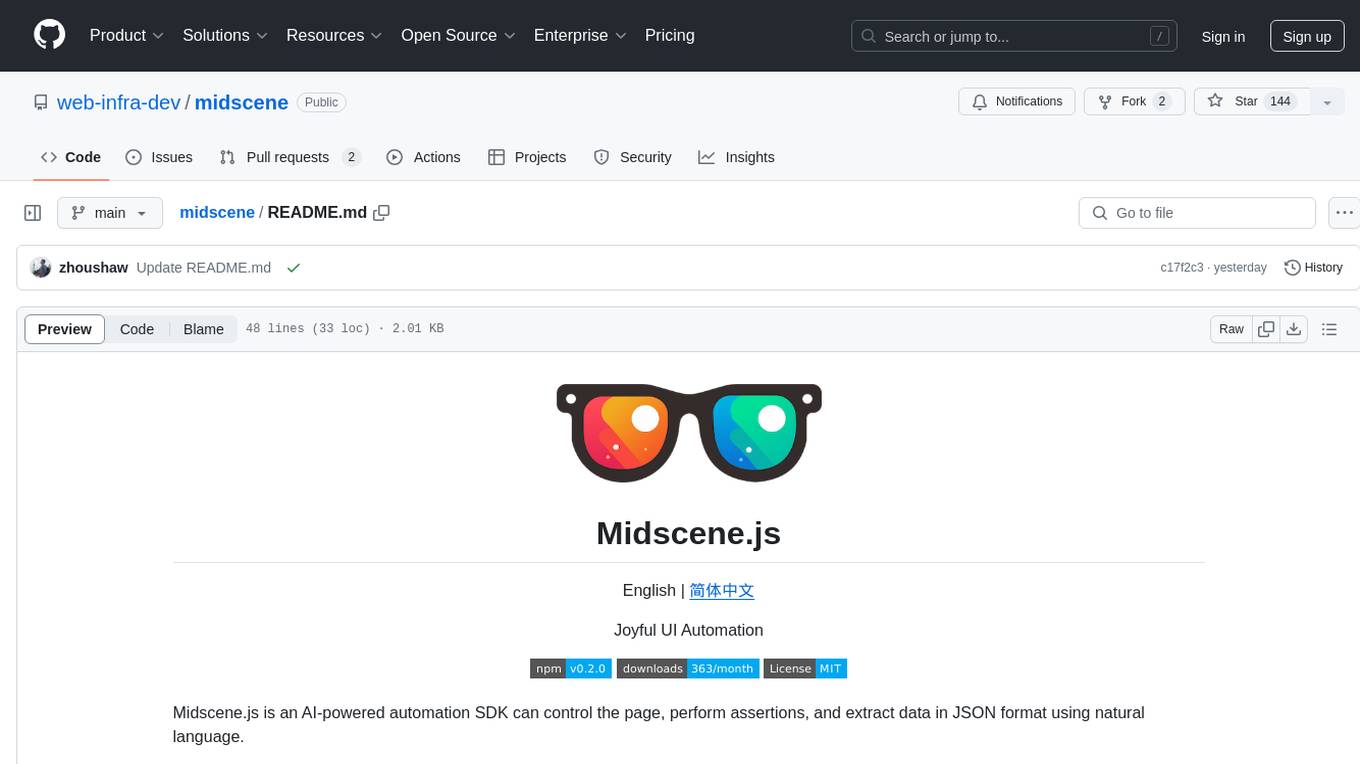
midscene
Midscene.js is an AI-powered automation SDK that allows users to control web pages, perform assertions, and extract data in JSON format using natural language. It offers features such as natural language interaction, understanding UI and providing responses in JSON, intuitive assertion based on AI understanding, compatibility with public multimodal LLMs like GPT-4o, visualization tool for easy debugging, and a brand new experience in automation development.
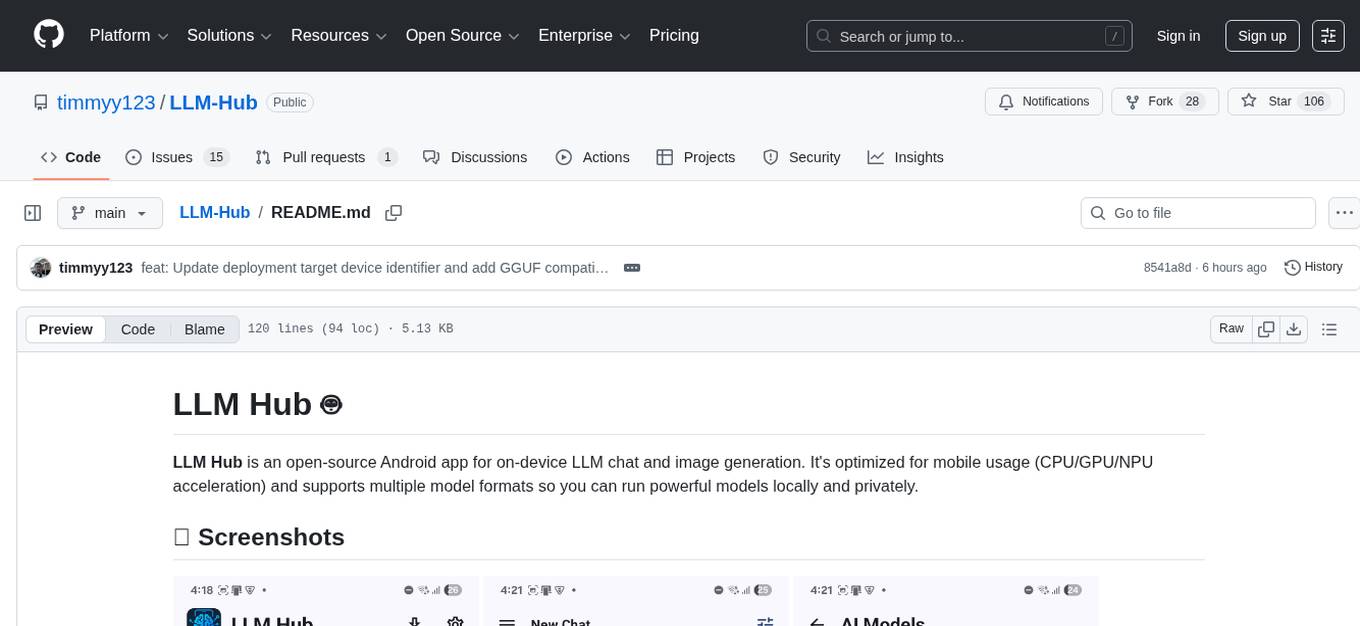
LLM-Hub
LLM Hub is an open-source Android app optimized for mobile usage, supporting multiple model formats for on-device LLM chat and image generation. It offers six AI tools including chat, writing aid, image generator, translator, transcriber, and scam detector. Privacy-first with on-device processing and zero data collection. Advanced capabilities include GPU/NPU acceleration, text-to-speech, RAG with global memory, and custom model import. Developed using Kotlin + Jetpack Compose, LLM Runtime, and various model runtimes.
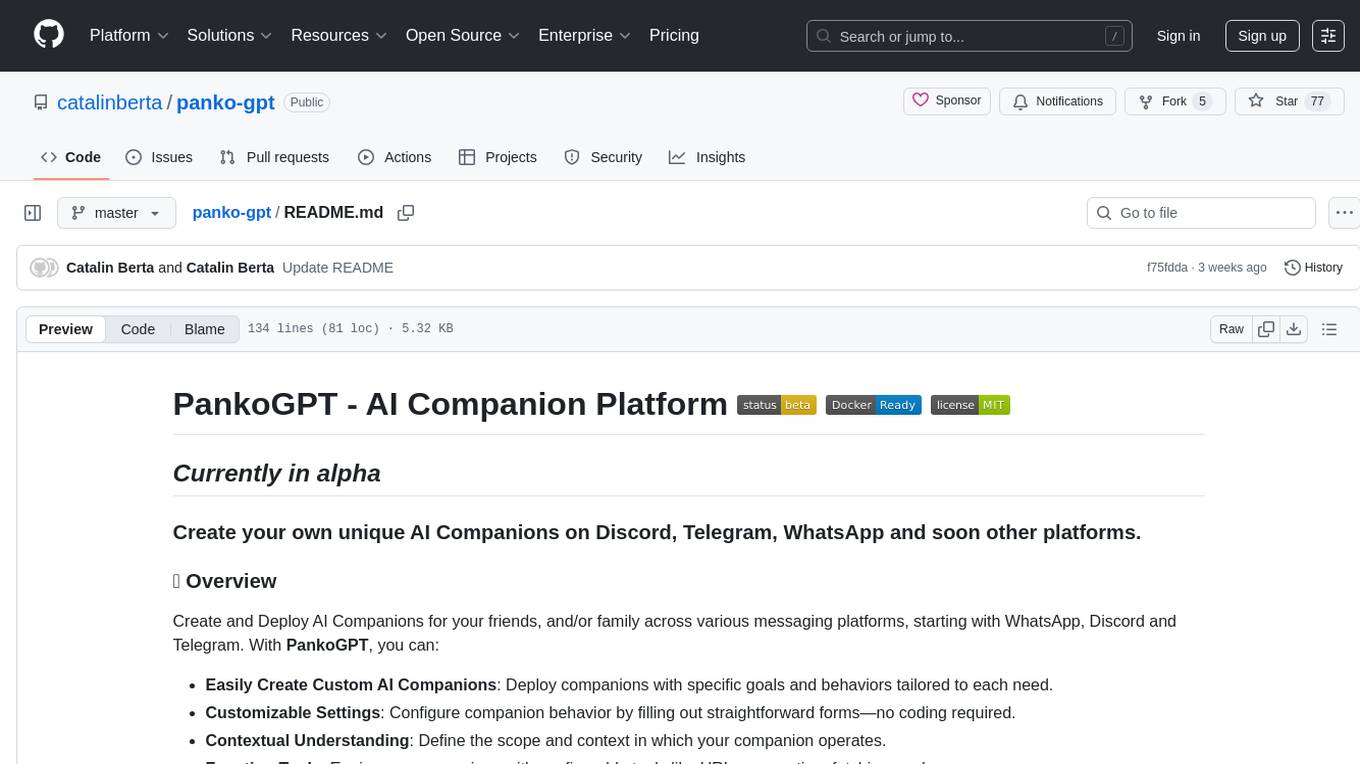
panko-gpt
PankoGPT is an AI companion platform that allows users to easily create and deploy custom AI companions on messaging platforms like WhatsApp, Discord, and Telegram. Users can customize companion behavior, configure settings, and equip companions with various tools without the need for coding. The platform aims to provide contextual understanding and user-friendly interface for creating companions that respond based on context and offer configurable tools for enhanced capabilities. Planned features include expanded functionality, pre-built skills, and optimization for better performance.
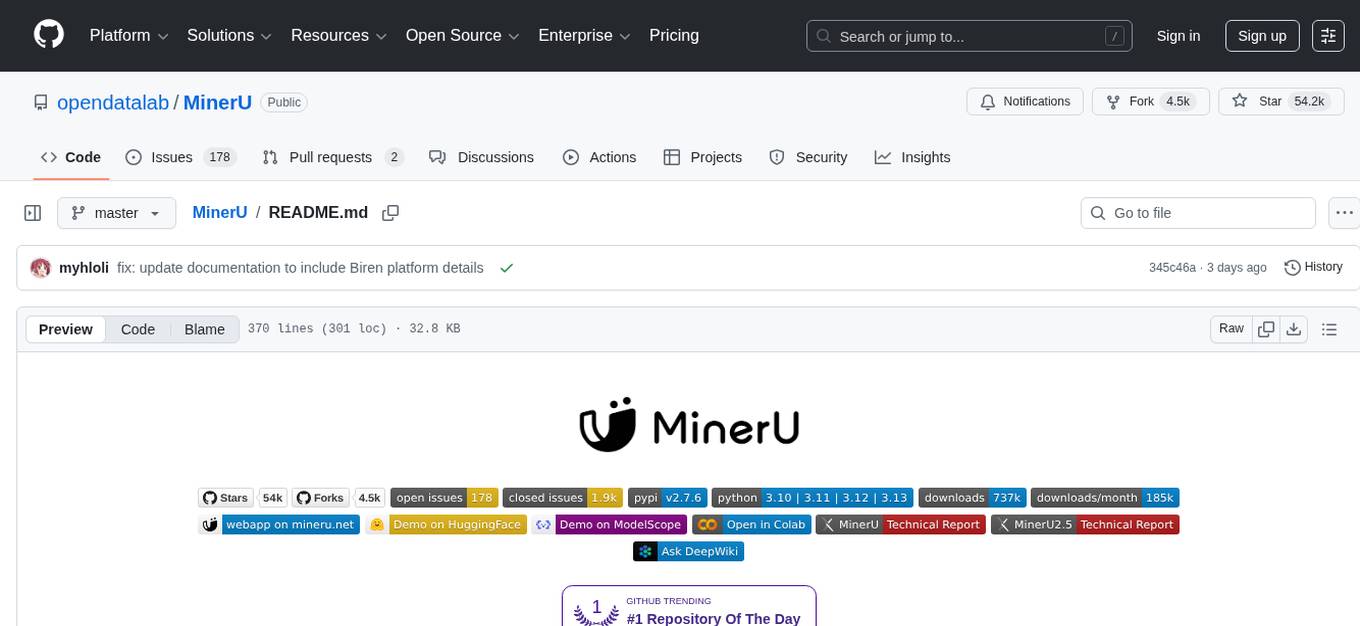
MinerU
MinerU is a tool that converts PDFs into machine-readable formats, allowing for easy extraction into any format. It focuses on solving symbol conversion issues in scientific literature and contributes to technological development. It removes headers, footers, footnotes, and page numbers, preserves document structure, extracts images, tables, and formulas, and supports OCR in 109 languages. MinerU supports various visualization results, runs on CPU/GPU/NPU, and is compatible with Windows, Linux, and Mac platforms.
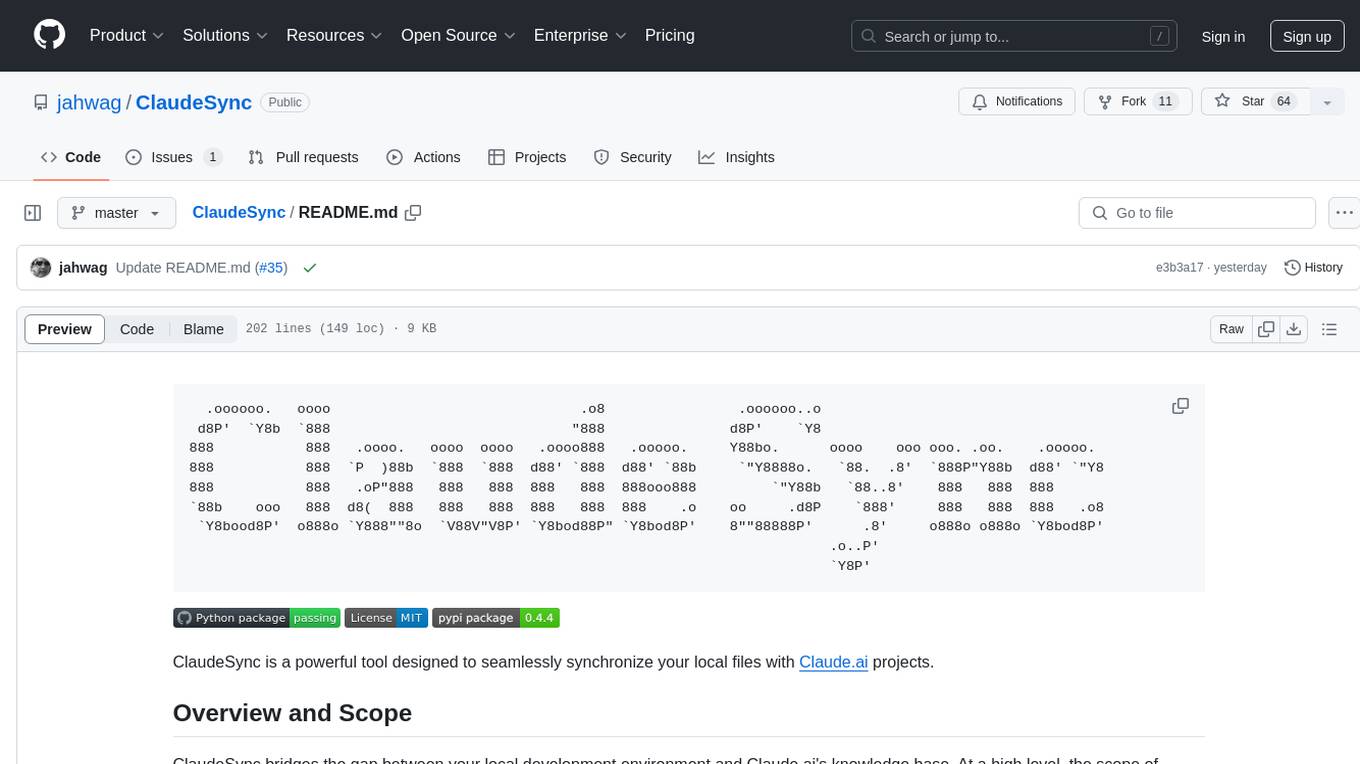
ClaudeSync
ClaudeSync is a powerful tool designed to seamlessly synchronize local files with Claude.ai projects. It bridges the gap between local development environment and Claude.ai's knowledge base, offering real-time synchronization, CLI for easy management, support for multiple organizations and projects, intelligent file filtering, configurable sync interval, two-way synchronization, and more. It ensures data privacy, open source transparency, and comes with disclaimers for use at own risk. Users can quickly start syncing by installing, logging in, selecting organization and project, and running sync. Advanced features include API, organization, project, file, chat management, configuration, synchronization modes, scheduled sync, providers, custom ignore file, and troubleshooting. Contributions are welcome, and communication channels include GitHub Issues and Discord. Licensed under MIT License.
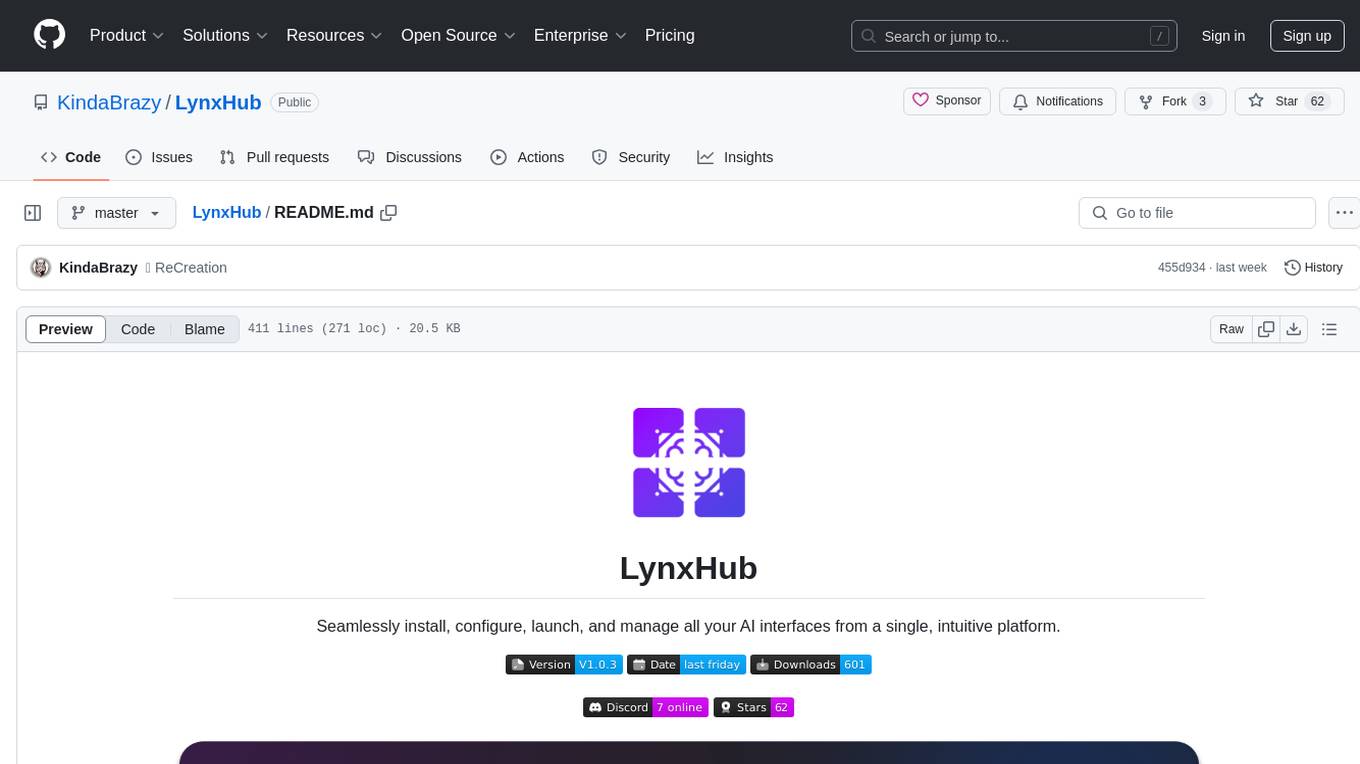
LynxHub
LynxHub is a platform that allows users to seamlessly install, configure, launch, and manage all their AI interfaces from a single, intuitive dashboard. It offers features like AI interface management, arguments manager, custom run commands, pre-launch actions, extension management, in-app tools like terminal and web browser, AI information dashboard, Discord integration, and additional features like theme options and favorite interface pinning. The platform supports modular design for custom AI modules and upcoming extensions system for complete customization. LynxHub aims to streamline AI workflow and enhance user experience with a user-friendly interface and comprehensive functionalities.
For similar tasks

Azure-Analytics-and-AI-Engagement
The Azure-Analytics-and-AI-Engagement repository provides packaged Industry Scenario DREAM Demos with ARM templates (Containing a demo web application, Power BI reports, Synapse resources, AML Notebooks etc.) that can be deployed in a customer’s subscription using the CAPE tool within a matter of few hours. Partners can also deploy DREAM Demos in their own subscriptions using DPoC.

sorrentum
Sorrentum is an open-source project that aims to combine open-source development, startups, and brilliant students to build machine learning, AI, and Web3 / DeFi protocols geared towards finance and economics. The project provides opportunities for internships, research assistantships, and development grants, as well as the chance to work on cutting-edge problems, learn about startups, write academic papers, and get internships and full-time positions at companies working on Sorrentum applications.

tidb
TiDB is an open-source distributed SQL database that supports Hybrid Transactional and Analytical Processing (HTAP) workloads. It is MySQL compatible and features horizontal scalability, strong consistency, and high availability.

zep-python
Zep is an open-source platform for building and deploying large language model (LLM) applications. It provides a suite of tools and services that make it easy to integrate LLMs into your applications, including chat history memory, embedding, vector search, and data enrichment. Zep is designed to be scalable, reliable, and easy to use, making it a great choice for developers who want to build LLM-powered applications quickly and easily.

telemetry-airflow
This repository codifies the Airflow cluster that is deployed at workflow.telemetry.mozilla.org (behind SSO) and commonly referred to as "WTMO" or simply "Airflow". Some links relevant to users and developers of WTMO: * The `dags` directory in this repository contains some custom DAG definitions * Many of the DAGs registered with WTMO don't live in this repository, but are instead generated from ETL task definitions in bigquery-etl * The Data SRE team maintains a WTMO Developer Guide (behind SSO)

mojo
Mojo is a new programming language that bridges the gap between research and production by combining Python syntax and ecosystem with systems programming and metaprogramming features. Mojo is still young, but it is designed to become a superset of Python over time.

pandas-ai
PandasAI is a Python library that makes it easy to ask questions to your data in natural language. It helps you to explore, clean, and analyze your data using generative AI.

databend
Databend is an open-source cloud data warehouse that serves as a cost-effective alternative to Snowflake. With its focus on fast query execution and data ingestion, it's designed for complex analysis of the world's largest datasets.
For similar jobs

sweep
Sweep is an AI junior developer that turns bugs and feature requests into code changes. It automatically handles developer experience improvements like adding type hints and improving test coverage.

teams-ai
The Teams AI Library is a software development kit (SDK) that helps developers create bots that can interact with Teams and Microsoft 365 applications. It is built on top of the Bot Framework SDK and simplifies the process of developing bots that interact with Teams' artificial intelligence capabilities. The SDK is available for JavaScript/TypeScript, .NET, and Python.

ai-guide
This guide is dedicated to Large Language Models (LLMs) that you can run on your home computer. It assumes your PC is a lower-end, non-gaming setup.

classifai
Supercharge WordPress Content Workflows and Engagement with Artificial Intelligence. Tap into leading cloud-based services like OpenAI, Microsoft Azure AI, Google Gemini and IBM Watson to augment your WordPress-powered websites. Publish content faster while improving SEO performance and increasing audience engagement. ClassifAI integrates Artificial Intelligence and Machine Learning technologies to lighten your workload and eliminate tedious tasks, giving you more time to create original content that matters.

chatbot-ui
Chatbot UI is an open-source AI chat app that allows users to create and deploy their own AI chatbots. It is easy to use and can be customized to fit any need. Chatbot UI is perfect for businesses, developers, and anyone who wants to create a chatbot.

BricksLLM
BricksLLM is a cloud native AI gateway written in Go. Currently, it provides native support for OpenAI, Anthropic, Azure OpenAI and vLLM. BricksLLM aims to provide enterprise level infrastructure that can power any LLM production use cases. Here are some use cases for BricksLLM: * Set LLM usage limits for users on different pricing tiers * Track LLM usage on a per user and per organization basis * Block or redact requests containing PIIs * Improve LLM reliability with failovers, retries and caching * Distribute API keys with rate limits and cost limits for internal development/production use cases * Distribute API keys with rate limits and cost limits for students

uAgents
uAgents is a Python library developed by Fetch.ai that allows for the creation of autonomous AI agents. These agents can perform various tasks on a schedule or take action on various events. uAgents are easy to create and manage, and they are connected to a fast-growing network of other uAgents. They are also secure, with cryptographically secured messages and wallets.

griptape
Griptape is a modular Python framework for building AI-powered applications that securely connect to your enterprise data and APIs. It offers developers the ability to maintain control and flexibility at every step. Griptape's core components include Structures (Agents, Pipelines, and Workflows), Tasks, Tools, Memory (Conversation Memory, Task Memory, and Meta Memory), Drivers (Prompt and Embedding Drivers, Vector Store Drivers, Image Generation Drivers, Image Query Drivers, SQL Drivers, Web Scraper Drivers, and Conversation Memory Drivers), Engines (Query Engines, Extraction Engines, Summary Engines, Image Generation Engines, and Image Query Engines), and additional components (Rulesets, Loaders, Artifacts, Chunkers, and Tokenizers). Griptape enables developers to create AI-powered applications with ease and efficiency.






